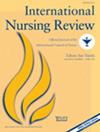Cultural Competence of Nursing Students After Their First Supervised Internships: An International Cross-Sectional Study
Abstract
Aim
To assess the level of cultural competence among European nursing students after their first clinical experience.
Design
A descriptive, cross-sectional study was conducted in 18 countries and 66 higher institutions with a sample of 2932 nursing students.
Methods
The Cultural Competence Assessment (CCA) tool was used in its original version (English) and its validated versions in Spanish, Italian, Portuguese, Turkish, and Lithuanian. The CCA includes 25 items, Likert-type normalized in a 0–100-point scale with two dimensions: Cultural Awareness and Sensitivity (CAS) subscale and Cultural Competence Behavior (CCB) subscale. An online anonymized questionnaire was used to collect the variables. The influence of background and acquired factors in CCA was analyzed with multivariate regression models.
Results
The mean level of cultural competence of the European undergraduate nursing students after their first supervised internships is at a good level. Significant associations were found between cultural competence level and language of the questionnaire, gender, religious community, current year of education, leisure stays abroad, and international experiences at home, but having friends from other countries or cultures was the most important factor to explain CCA. The explained variance of CCA by these factors was low.
Conclusions
The international perspective of cultural competence among undergraduate nursing students at the starting point of their clinical experience provided by this study serves as an important preview of where European nursing education currently stands as a baseline scenario for designing, providing, and assessing adequate educational strategies for being a culturally competent nurse at the point of graduation.
Implications for the profession and patient care
The study highlights specific factors that contribute to higher levels of cultural competence. These insights can be used to further improve nursing education by providing more opportunities for students to engage with diverse cultures, resulting in enhanced cultural competence, which can lead to better patient care and higher satisfaction in diverse environments.
Impact
The findings can guide future research and curriculum development, emphasizing the importance of creating educational strategies to enhance cultural competence. By understanding the predictors of cultural competence, educational institutions can design targeted interventions that improve the quality of care and patient satisfaction in multicultural settings, as well as helping to reduce health inequalities and promote a more inclusive healthcare environment.
Reporting Method
This research is reported in accordance with the STROBE guidelines.
Public Contribution
A wide network of European higher education institutions was contacted. Nursing students from those willing to participate were voluntarily involved in this study by answering the CCA questionnaire.

 求助内容:
求助内容: 应助结果提醒方式:
应助结果提醒方式:


